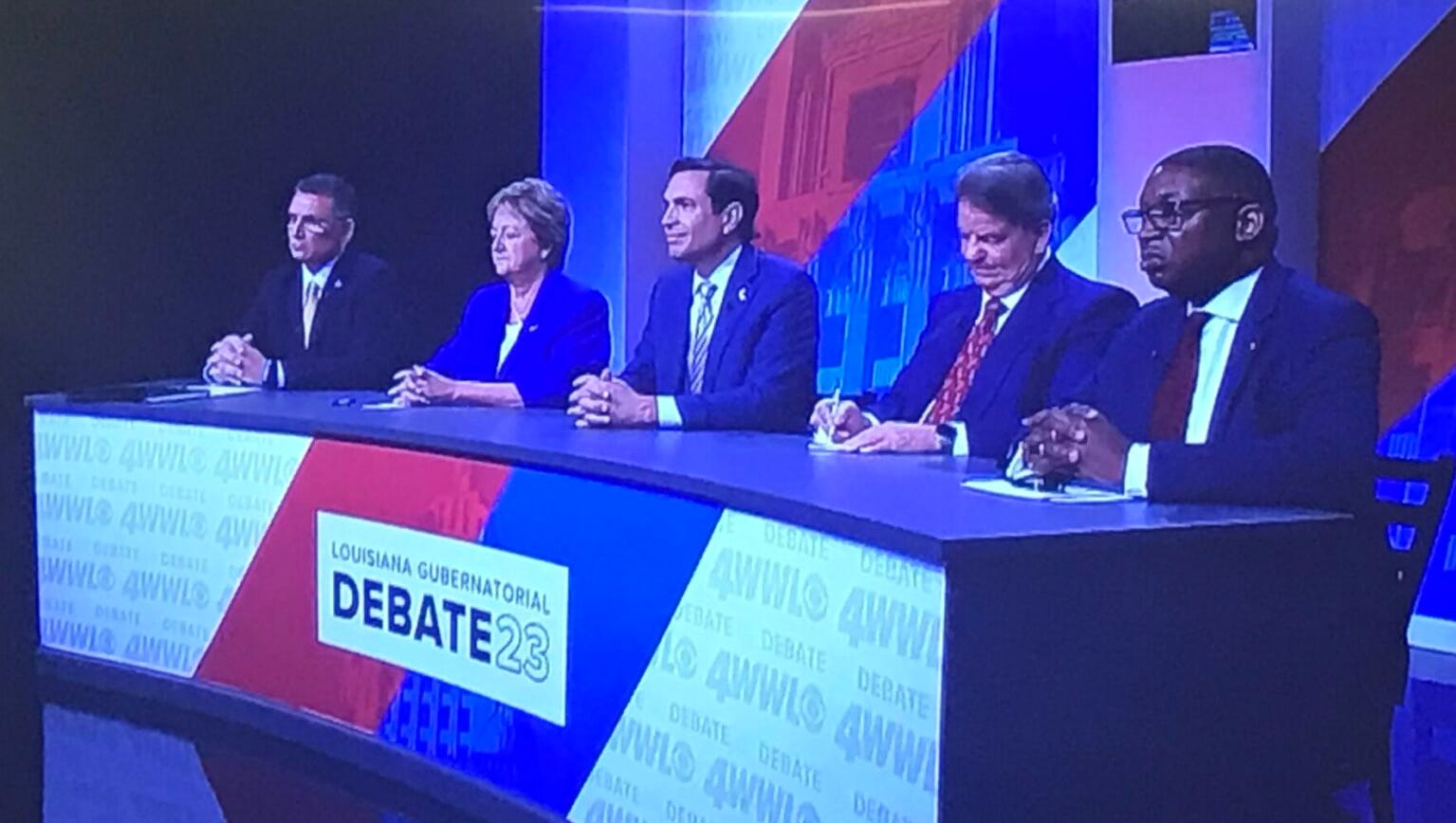Louisiana
Candidates for Louisiana governor take few risks in first TV debate, minus Landry

NEW ORLEANS – The five candidates for Louisiana governor took part Thursday night in the first televised debate ahead of the Oct. 14 primary, minus the current frontrunner whose absence didn’t go unnoticed by his competitors.
Attorney General Jeff Landry said he chose to bypass the debate, hosted by WWL-TV, because he considers one of its co-sponsors, the Urban League of Louisiana, biased against Republicans. So far, the attorney general has skipped all forums and events where he would have shared the stage with the other candidates, although he has committed to participating in the Sept. 15 Nexstar Television debate in Lafayette.
With Landry absent, state Sen. Sharon Hewitt, attorney Hunter Lundy, Treasurer John Schroder, business lobbyist Stephen Waguespack and former transportation secretary Shawn Wilson fielded questions from journalists.

On some issues — such as making teacher pay raises permanent (support) and raising the state tax on gasoline sales (against) — all five candidates agreed, and they predictably took party lines on other matters. For example, Wilson, the lone Democrat, said he supported a voter referendum on abortion in Louisiana, while Republicans Hewitt, Schroder and Waguespack, along with conservative independent Lundy, said they stood by the Louisiana Legislature’s decision to exclude exceptions for rape and incest in the state’s abortion ban.
“Our legislature has proven it’s too extreme for Louisiana,” Wilson said.
The five candidates also answered as expected, although not directly, when asked how they would respond to out-of-state businesses who raise concerns about the recent proliferation of anti-LGBQT+ legislation. Hewitt, Lundy and Waguespack said the legislature’s approval of a gender-affirming care ban for youth was about protecting children. Schroder made an ambiguous reference to the Old Testament while explaining the issue as “an attack on the family.” Wilson criticized lawmakers for spending so much time in their session debating “issues that infringe on people’s rights.”
The debate was not entirely without surprises, however.
When asked about deficiencies in environmental protection for the disadvantaged communities near industrial sites, Schroder said he had problems with the proposed carbon capture project under Lake Maurepas and industrial developments in St. Bernard and Plaquemines parishes that he said have forced residents to relocate.
“I don’t like the way government decides they’re going to stuff something down a community’s throat,” the treasurer said.
Schroder also differed from the other four candidates when asked about solving Louisiana’s property insurance crisis. While the rest said they intend to call the legislature into special session to tackle the problem, Schroder said he would hold a “summit” with the insurance and construction industries and “billboard lawyers” taking part.
“We’re going to have to fix it one way or the other,” Schroder said.
The candidates were allowed to give yes-or-no answers to a series of “rapid fire” questions. On whether they believed — as court rulings imply — Louisiana needs to add a second majority-Black district to its congressional map, Lundy and Wilson said yes, while Hewitt, Schroder and Waguespack said they would abide by whatever ruling courts make.
All five candidates opposed a COVID-19 vaccine mandate for K-12 schools, but they differed on raising the state’s minimum wage, pervasive racism within Louisiana State Police and renewing a 0.45% portion of the state sales tax that will expire in two years.
Lundy, Schroder and Wilson supported an increase in Louisiana’s $7.25 minimum wage, which has gone unchanged since 2009. Hewitt offered a “maybe” as she noted she opposed a hike this past legislative session, while Waguespack offered a flat no.
The 0.45% sales tax should come off the books if the state can expand its economy, Waguespack said. Lundy and Wilson support renewing the tax, while Hewitt and Schroder are against it.
Hewitt, Schroder and Waguespack condemned the 2019 death of Ronald Greene, a Black motorist, at the hands of white state troopers, but they do not think racism is an across-the-board problem for State Police.
Lundy said there is a problem with racism in the agency. Wilson first provided the same answer but then dialed back his response by saying it’s not department-wide.
Landry did not escape totally unscathed in the debate. Hewitt said the attorney general is “not a friend of the oil and gas industry” because he’s sided with trial lawyers in more than 200 lawsuits against the oil and gas industry. Schroder said Landry has also “failed to show up” as the state’s top law enforcement official to address persistent crime.
The other slight controversy of the night was the exclusion of state Rep. Richard Nelson from the debate. Sponsors said he didn’t poll well enough to be added to the field, although he has been invited to take part in future televised debates.
In addition to WWL and the Urban League, sponsors of the debate were WBRZ-TV of Baton Rouge, KTBS-TV of Shreveport, KATC-TV of Lafayette, The Advocate | The Times-Picayune and the Public Affairs Research Council of Louisiana.
— The Louisiana Illuminator is an independent, nonprofit, nonpartisan news organization driven by its mission to cast light on how decisions are made in Baton Rouge and how they affect the lives of everyday Louisianians, particularly those who are poor or otherwise marginalized.












You must be logged in to post a comment Login